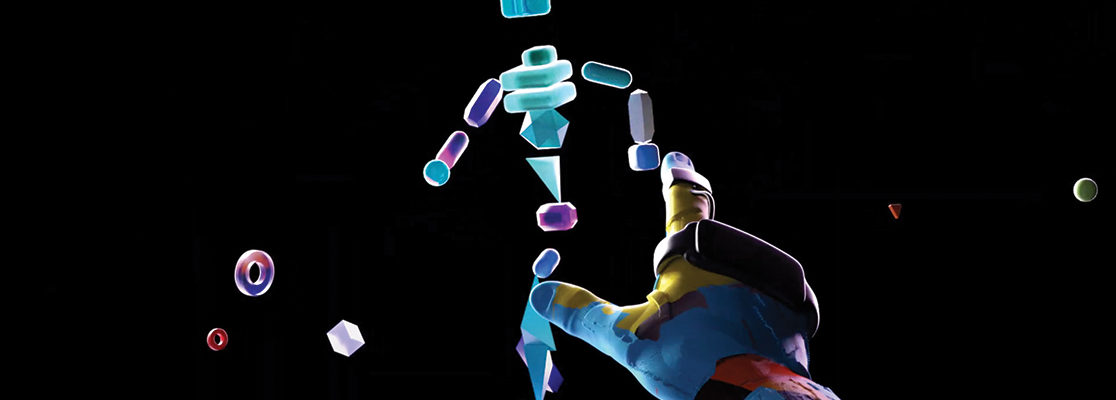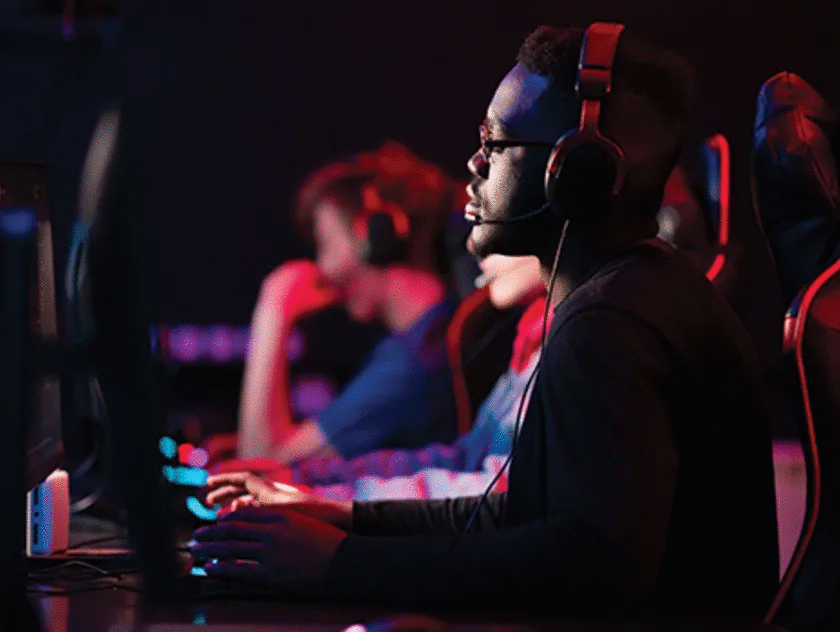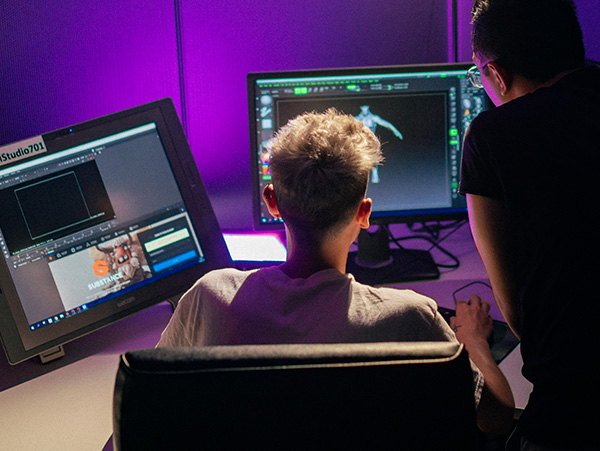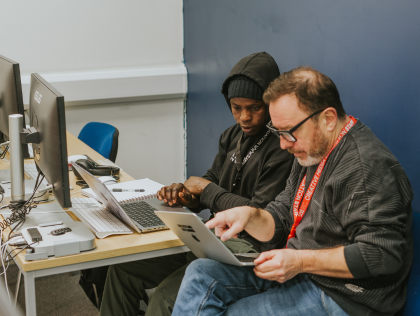BA/BSc (Hons) Game Design Degree
Design, production, testing. Study Game Design and gain experience in the full game production pipeline. Start in January or September.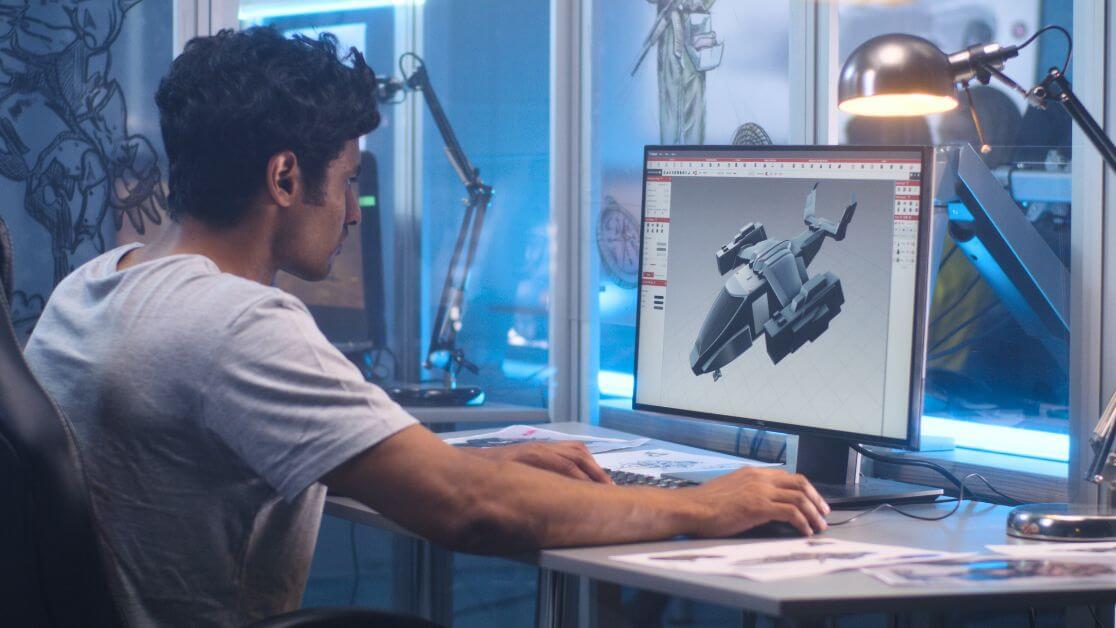
TWO-YEAR ACCELERATED DEGREE:
£9,000 per year
You may also be eligible for a bursary or discount, please enquire with our friendly Admissions Team.
THREE-YEAR DEGREE:
£7,500 per year
You may also be eligible for a bursary or discount, please enquire with our friendly Admissions Team.
TWO-YEAR ACCELERATED DEGREE:
£11,440 per year
THREE-YEAR DEGREE:
£9,535 per year
TWO-YEAR ACCELERATED DEGREE:
£11,440 per year
THREE-YEAR DEGREE:
£9,535 per year
The annual tuition fee is fully funded via Student Finance England for eligible home-fee students.
TWO-YEAR ACCELERATED DEGREE:
£11,440 per year
THREE-YEAR DEGREE:
£9,535 per year
The annual tuition fee is fully funded via Student Finance England for eligible home-fee students.
TWO-YEAR ACCELERATED DEGREE:
£11,440 per year
THREE-YEAR DEGREE:
£9,535 per year
The annual tuition fee is fully funded via Student Finance England for eligible home-fee students.
TWO-YEAR ACCELERATED DEGREE:
International students (non-EU/EEA/Swiss)*: £16,500 per year
EU/EEA/Swiss students*: £12,500 per year
THREE-YEAR DEGREE:
International students (non-EU/EEA/Swiss)*: £15,750 per year
EU/EEA/Swiss students*: £11,250 per year
*Student visa required
For more information regarding SAE’s EU/EEA/Swiss students bursary policy, please read the SAE UK EU Students Bursary Policy.
TWO-YEAR ACCELERATED DEGREE:
International students (non-EU/EEA/Swiss)*: £16,500 per year
EU/EEA/Swiss students*: £12,500 per year
THREE-YEAR DEGREE:
International students (non-EU/EEA/Swiss)*: £15,750 per year
EU/EEA/Swiss students*: £11,250 per year
*Student visa required
For more information regarding SAE’s EU/EEA/Swiss students bursary policy, please read the SAE UK EU Students Bursary Policy.
TWO-YEAR ACCELERATED DEGREE:
International students (non-EU/EEA/Swiss)*: £16,500 per year
EU/EEA/Swiss students*: £12,500 per year
THREE-YEAR DEGREE:
International students (non-EU/EEA/Swiss)*: £15,750 per year
EU/EEA/Swiss students*: £11,250 per year
*Student visa required
For more information regarding SAE’s EU/EEA/Swiss students bursary policy, please read the SAE UK EU Students Bursary Policy.
TWO-YEAR ACCELERATED DEGREE:
International students (non-EU/EEA/Swiss)*: £16,500 per year
EU/EEA/Swiss students*: £12,500 per year
THREE-YEAR DEGREE:
International students (non-EU/EEA/Swiss)*: £15,750 per year
EU/EEA/Swiss students*: £11,250 per year
*Student visa required
For more information regarding SAE’s EU/EEA/Swiss students bursary policy, please read the SAE UK EU Students Bursary Policy.
TWO-YEAR ACCELERATED DEGREE:
International students (non-EU/EEA/Swiss)*: £16,500 per year
EU/EEA/Swiss students*: £12,500 per year
THREE-YEAR DEGREE:
International students (non-EU/EEA/Swiss)*: £15,750 per year
EU/EEA/Swiss students*: £11,250 per year
*Student visa required
For more information regarding SAE’s EU/EEA/Swiss students bursary policy, please read the SAE UK EU Students Bursary Policy.
September 2025
September 2025
January and September
January and September
September 2025
Offers will be made to applicants who are expected to meet, or exceed the entry requirements below, in addition to supplying a personal statement:
SAE Institute will accept non-standard entry applications, which do not meet the 72 UCAS points or equivalent, and/or maths/English at level 2 or equivalent as required:
Students whose first language is not English will need a qualification that demonstrates competence in English, equivalent to UK GCSE (Level 2) grade 4 (c) or above.
Equivalent qualifications can be accepted, where these qualifications have been verified by ENIC and are adopted widely within the UK Higher Education sector, including:
- Listening – 17
- Writing – 17
- Speaking – 20
- Reading – 18
- International ESOL C1 Expert – pass in all four components
- International ESOL SELT B2 (Listening, Reading, Writing, Speaking) – minimum 33 in all components
- ESOL Integrated Skills in English II – pass in all components
What you can expect from your degree
The gaming industry has exploded in recent years thanks to exciting technological advances that have opened the door to dynamic, immersive experiences like never before. With gaming companies on the lookout for talented game designers, programmers and testers, now’s the perfect time to study a game design degree course.
At SAE, you’ll learn how to design and develop next-level video games while advancing your game development and programming skills. Beat the competition by graduating industry-ready more quickly with a 2-year accelerated degree (all campuses) – saving money on course and accommodation fees – or take the more traditional 3-year route (across all campuses from September 2025 onwards).
Across your time at SAE, you’ll explore level design and narrative construction by completing real-world project briefs in a simulated games studio environment. You’ll gain advanced skills in industry-standard software packages, such as Unreal Engine 5, Unity 3D, Adobe Creative Suite, Autodesk Suite (Maya) and Visual Studio, plus expert proficiency in programming languages C# and C++.
SAE’s highly experienced Experts will introduce you to the professional world of game design, showing you the ropes in programming, UI/UX design and industry workflows. As you explore common game engines and asset development fundamentals, you’ll complete group projects and run playtesting for the games you’ve developed, validating your understanding of game design theory and application.
Levelling up
As you progress your studies, you’ll get ready to embrace real-world success thanks to SAE’s focus on practical learning, business planning skills and games industry knowledge. In your final trimester/semester, you’ll complete a Major Project in a chosen area of specialism – a perfect opportunity to connect with industry experts with a view to future game design employment.
At the end of your time with us, you’ll graduate equipped with the skills of a professional game developer and ready to launch into the industry as a game designer, game developer, concept artist, multimedia specialist or software engineer. Simply put, SAE’s groundbreaking game design degree really puts you ahead of the game.

What you'll learn
- Learn game development and master your craft in a collaborative studio-based environment.
- Confidently operate the latest industry software, including Unreal Engine 5, Autodesk’s Maya, Unity 3D, Visual Studio and Adobe Creative Suite.
- Blend hands-on immersive training with academic learning for well-rounded education from day one.
- Design and playtest games you love playing.
- Gain entrepreneurial and business skills to take into your game design career.
- Collaborate creatively on games projects with SAE students from other courses, such as animators, musicians, filmmakers and marketers.
- Develop a significant portfolio of work to present to industry.
- Build an impressive network of connections across the wider creative industries.
- Graduate career ready with practical employment skills gained through strong industry links.
- Game design course start dates available in January and September.
YOUR CAREER IN GAME DESIGN BEGINS NOW

COURSE STRUCTURE
The BA/BSc (Hons) Game Design course is available as an accelerated 2-year degree, split over 6 trimesters, and a more traditional 3-year degree, divided over 6 semesters. It is arranged in 3 distinct stages – each formulated to help you uncover specific skills. Organising it this way makes sure you graduate as an accomplished game designer with a thorough understanding of the whole game development process from start to finish.
• Stage 1 (T1/S1 and T2/S2) provides a foundation of core technical knowledge.
• Stage 2 (T3/S3 and T4/S4) broadens your skills, and collaboration, exploring new areas of game design.
• Stage 3 (T5/S5 and T6/S6) is all-encompassing, covering every aspect of game development from conception to completion, including entrepreneurial aspects like project management, business planning and marketing.
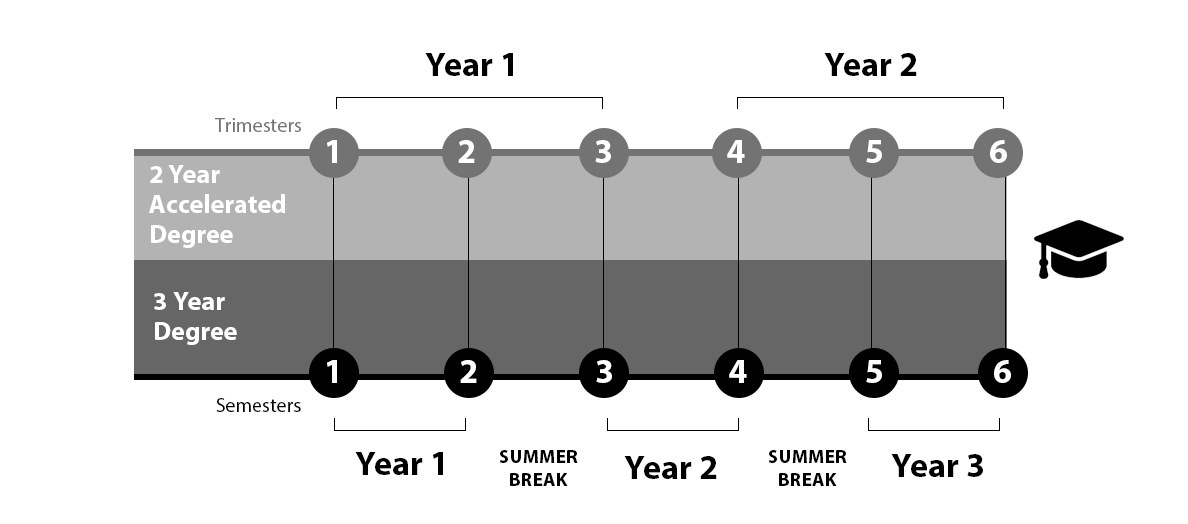
Topics include:
- Programming basics
- Structured programming
- Object-oriented programming
- Introduction to algorithms
- Boolean algebra and numeral systems
- Vector arithmetic
- Version control
Topics include:
- Game design fundamentals
- Game engine basics
- Game mechanics
- Game mechanism
Topics include:
- Asset management and creation
- Playtesting and QA
- Data collection principals and ethics
- Statistics for game design
- UI/UX
- Level design
Topics include:
- Academic research and writing
- Game production basics (agile/scrum, kanban, risk analysis, etc)
- History and culture of games
- Ethics of video games
- Theories of play (flow, magic circle, MDA)
- Narrative in video games
Topics could cover:
- Rapid prototyping
- Games narrative
- Reward systems
- User interface and user experience (UI/UX) design
- World building
Topics could cover:
- Commercial games
- Modern marketplaces for games
- Games product lifecycle
- GAAS
- Mobile and platforms
- Business planning
- Marketing
Topics may include:
- Serious Games
- Game economies
- Playtesting
- Psychology of games
- MDA
- Accessibility
- Level Design
WHY STUDY GAME DESIGN AT SAE?

Accelerated learning
Choose to enter the industry more quickly with our game design accelerated degree – completed in 2 rather than 3 years – and also save on tuition fees and living expenses. Or you might prefer to complete your studies across a more usual 3-year period so you can make the most of your university summer break.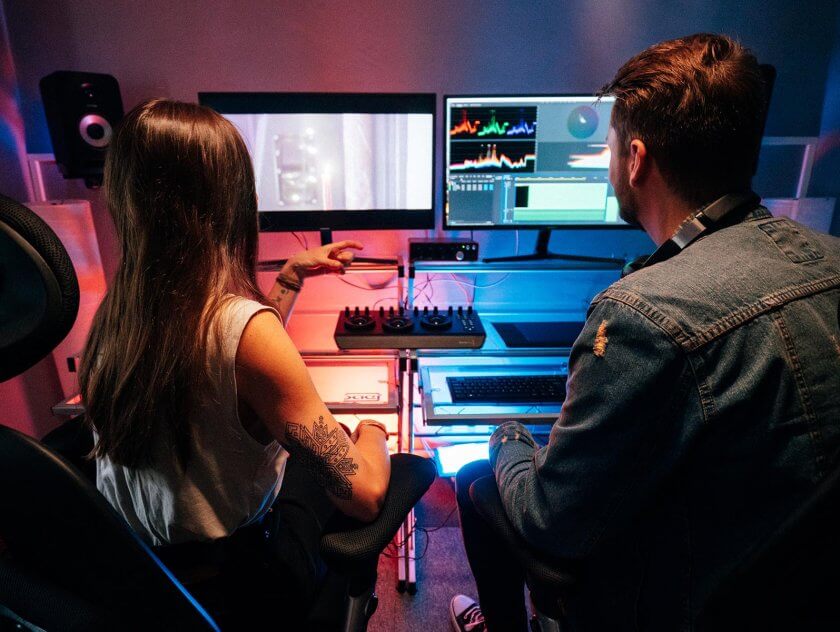
Creative collaboration
Unleash your artistic side and network with fellow Game Design creatives, as well as industry practitioners and those studying other SAE disciplines.
Career Outcomes
What jobs will this course lead to?
- Game Designer
- Game Tester
- Game Programmer
- Game Animator
- Game Developer
- Android Developer
- Concept Artist
- VFX artist
- Game Writer
- Level Designer
- Gaming Journalist
- UI Designer
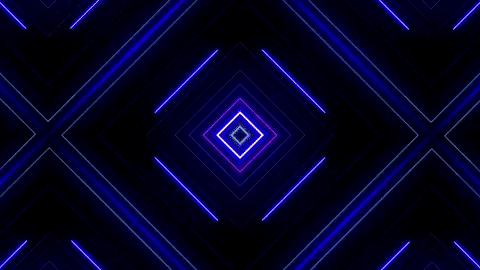
YOUR DREAM CAREER BEGINS NOW
With our industry connections, specialised teachers and personalised education in world-class facilities, you can unleash your creative future with confidence.Course FAQs
While we recommend that anyone invest in their hardware, our labs are kitted out with high-end PCs that you can access for your classes. Students can also book access to PCs when they aren’t in use.
We are looking to see an applicants’ best and most refined artwork in whatever medium they choose, and should evidence their creativity and technical skill. You are welcome to contact our admissions team for advice on what you should include.
We are looking to see applicants passion for film, if you have created any work before applying. This can include examples of your work, script work or practical mov examples or anything creative and film related that boosts your creative vision. We would also like a 800 word write up of why you want to study film production as well as what your favourite is and why? (400 words on each). You are welcome to contact our admissions team for advice on what you should include.
You can provide a PDF document or a personal URL with your artwork. Traditional artwork should be scanned and submitted in a digital image format like JPEG, or as part of a PDF.





